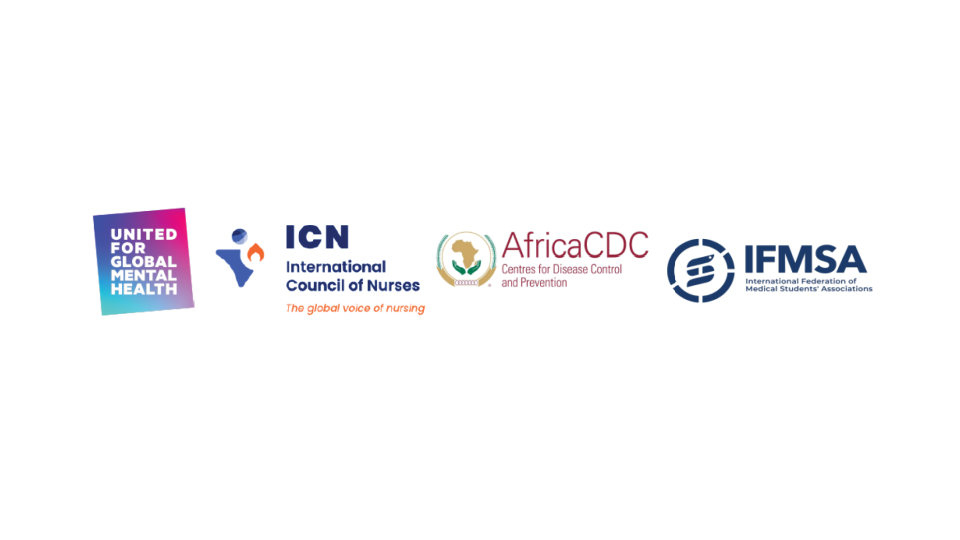Global Campaign Launched to Prioritise the Mental Health of Health Professionals on World Mental Health Day

Global Campaign Launched to Prioritise the Mental Health of Health Professionals on World Mental Health Day This World Mental Health Day, United for Global Mental Health, Africa CDC, the International Council of Nurses (ICN), and the International Federation of Medical Students’ Associations (IFMSA) are launching a global campaign to call for more global attention on the mental health needs of health workers worldwide.
The campaign seeks to amplify the voices of frontline health professionals and future health professionals, (global medical and nursing students), to raise awareness about the factors that make health workers particularly vulnerable to mental ill-health.
During the height of the COVID-19 pandemic, at least 25% of health and care workers reported symptoms of anxiety, depression, and burnout. However, the mental health crisis in the health sector persists, exacerbated by staff shortages, low pay, and stressful working conditions.
United for Global Mental Health CEO, Sarah Kline said, “A thriving and mentally healthy workforce is the cornerstone of any healthcare system. To deliver quality mental and physical health care, we must ensure that healthcare workers themselves have the mental and physical health support they need.”
Africa CDC, Director General H.E. Dr Jean Kaseya said, '’The mental health of our healthcare workforce is fundamental to the resilience of our health systems. Frontline workers have carried the weight of unprecedented health crises, often at the cost of their own well-being. As we launch this important campaign, Africa CDC remains committed to ensuring that healthcare professionals across the continent receive the mental health support they need to continue saving lives and strengthening our communities.’’
International Council of Nurses CEO, Howard Catton said, “Nurses everywhere face physical and psychological pressures from the stressful nature of their work, so it is vital that they receive the support they need to continue delivering their unique brand of care. Their work can be traumatising, especially for those working in conflict zones and humanitarian aid situations, and the environments that they deliver care in can be toxic and violent. What the world’s nurses need is an urgent and concerted effort to combat workplace violence, improve their pay and working conditions, increase nurse staffing levels and expand occupational health services. ICN has addressed these issues in its Charter for Change and The Economic Power of Care reports, which include clear recommendations for a better future for nurses and the people they care for.”
The International Federation of Medical Students’ Associations (IFMSA) Liaison Officer for Public Health Issues, Jaber Oufkir said, “The International Federation of Medical Students’ Associations recognizes the global burden of mental health conditions, especially among vulnerable communities. Among medical students, the alarming data showcases that 27% suffer from depression and 34% from anxiety, increasing significantly during health emergencies, as demonstrated during the COVID-19 pandemic. As future doctors, we advocate for implementing effective initiatives to promote mental health and well-being among healthcare professionals and the general public. We also call for stakeholders to build inclusive strategies to integrate mental health care into health systems. IFMSA firmly believes that there can be no health without mental health, and immediate global action is needed.”
United for Global Mental Health and its partners Africa CDC, ICN and IFMSA are calling for immediate action to support the mental health of health workers. This includes investing in mental health training for health professionals, integrating mental health into primary health strategies and fostering a work culture where mental health is prioritised.
Further Information
- Read more about World Mental Health Day, watch videos from current and future health workforce and read stories about health workers around the world (see extracts below)
- For more information on United for Global Mental, an international non-governmental organisation (NGO) dedicated to promoting and advancing mental health worldwide: https://unitedgmh.org/#
- For more information on Africa CDC, the continental autonomous health agency of the African Union: https://africacdc.org/
- For more information on the International Council of Nurses, a federation of over 130 national nurses associations representing nurses worldwide: https://www.icn.ch/
- For more information on the International Federation of Medical Students’ Associations (IFMSA) - one of the world’s oldest and largest student-run organisations: https://ifmsa.org/
Ramatou Irene Nombro, a Resident Psychiatric Doctor in Bamako (Mali) and one of just 15 public psychiatrists in the whole country, said:
“The working conditions in Mali are horrible. There are not enough mental health doctors, nurses or even security guards. I love what I do, I love mental health but we don’t have the systems in place to help the health workers. When people are tired, they can’t work efficiently or effectively, and they won’t take good care of their patients”
Joseph Macharia, a Psychologist in Kenya where there is just one senior Psychologist available for one day a week in the area where he works, said:
“You find yourself facing so many patients at once. It’s impossible to keep up, and yet the expectations don’t change. Imagine being the person responsible for providing care to others, but when it’s your turn, there’s no one there for you. As health care workers we are often seen as pillars of strength, but we are also human beings who need mental health support just as much as the patients we serve.”
Sania Aziz, Program Manager (Psychologist) at Lord Sarfraz Foundation in Pakistan on how she manages her mental health now following severe burnout, said:
“If I couldn’t conduct a session, I used to feel bad and self-conscious, like I had failed my patients. But now I take time off to care for myself because I deserve to show up as my best self so I can provide the best support possible.”